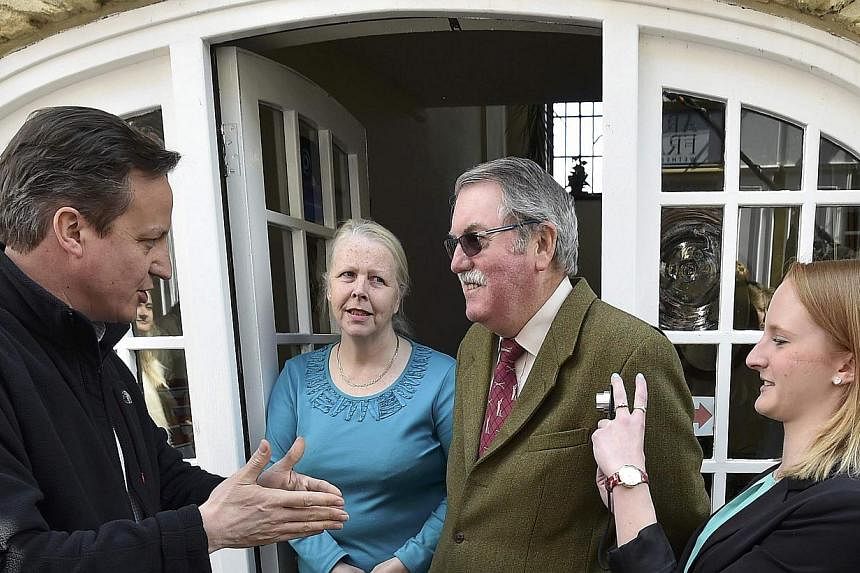LONDON (AFP) - A feisty audience grilled Britain's political leaders on Thursday over what deals and compromises could be in store after an election expected to produce a hung parliament next week.
The final leaders' television event before the May 7 vote saw Conservative Prime Minister David Cameron, Labour party leader Ed Miliband, and Liberal Democrat Nick Clegg questioned by ordinary Britons in Leeds in northern England.
Audience members demanded the leaders lay out their plans if no one party wins a majority as polls suggest, pressing them on which manifesto promises were non-negotiable "red lines".
"I'm going to spend the next seven days flat out for victory, and if enough people watching this programme back at home back me, we can have that victory and have the whole manifesto rather than having it bartered away in a darkened room," Cameron said.
Holding a referendum on whether Britain should remain a member of the European Union would be his "red line" if he had to negotiate with other parties to form a government, Cameron said.
"The British people really deserve a referendum on the EU," Cameron said. "I would not lead a government that did not contain that pledge."
STUMBLE
Cameron insisted that the centre-left Labour party could not be trusted to run Britain's economy, and brandished a letter left in the Treasury from the outgoing Labour government in 2010 reading "I'm afraid there is no money. Kind regards - and good luck!"
Miliband dismissed the letter as Cameron's "regular prop" and told the audience he believed in a country which had "one rule for all, not one rule for the rich and powerful and another for everybody else".
He ruled out a deal with the Scottish National Party in order to form a government - something the pro-independence leader Nicola Sturgeon has put on the table as her party looks set to take most of Scotland's seats.
"We are not going to do a deal with the Scottish National Party," Miliband said. "If it meant we weren't going to be in government not doing a coalition, not having a deal, then so be it."
In a later interview, SNP leader Sturgeon said "the most likely outcome is where we are supporting a Labour minority government on an issue-by-issue basis".
As Miliband left the stage, he stumbled slightly - a clip shared widely on social media as something of a blow to his attempts to cast off a socially awkward image.
NO MAJORITY
An instant poll showed the most viewers thought Cameron had done best in the event, on 44 per cent followed by 38 per cent for Miliband.
Clegg, who has been in coalition with the centre-right Conservatives since the previous election did not return a one-party majority in 2010, argued his Liberal Democrats would be the best partner for either the Conservatives or Labour by anchoring them to "the centre ground".
"Either David Cameron or Ed Miliband are going to be prime minister... The real question is: who is going to go in there alongside them?" Clegg asked.
"If either of them still think they are going to win a majority they need to go and lie down in that darkened room," he quipped.
Giving a role in government to either the anti-EU, anti-immigrant UK Independence Party or Scotland's SNP would mean a "lurch off to the right or the left", Clegg argued.
He said he would oppose a referendum on the EU unless more British sovereign powers were passed to the bloc.
The BBC's poll of polls currently shows the Conservatives on 34 per cent support and Labour on 33 per cent, with seat calculators showing neither are likely to win enough seats to rule alone.
The SNP is predicted to become Britain's third-biggest party due to a surge in support in the wake of the 2014 Scottish independence referendum, followed by the Liberal Democrats.

